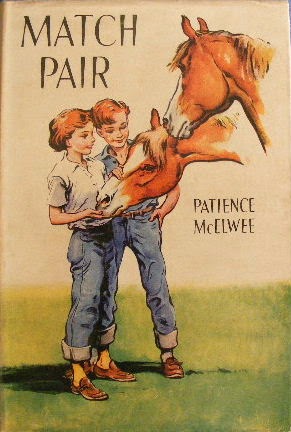PBOTD: 29th March, Patience McElwee: Match Pair
Patience McElwee (1910-1963) was a fine writer best known as an author of books for adults; her three pony books although nominally aimed at children are really a far more successful read for the adult reader who enjoys a biting appreciation of the snobberies and silliness that infest the world of the pony. Her plots are straightforward – in all of them problems are overcome, and a happier place reached; but it is in the observation of character and situation that the books are most successful. Perhaps it was Patience McElwee’s distance from the horsy world that helped. She was not herself a rider: her daughter Harriet Hall said “My father and I both hunted most weeks and my mother would come to the meets, but she was terrified of horses and never willingly had direct contact with one. She did, however, know a lot about the racing world and could talk horse brilliantly.” It was Harriet’s experience of the Pony Club that Patience McElwee drew on; particularly for Match Pair, where the ruthless depiction of Pony Club parents stings; a portrait that could perhaps only be written by someone watching that world but not part of it.
The children in her books generally have considerably more sense than the adults: Jane Howell, the teenage narrator of Match Pair (1956), looks on the grown ups surrounding her with an unsparing eye. Jane and her twin brother Adam have been shipped over from America, where they live with their diplomat father and their stepmother, and Mademoiselle, who “looked after our stepmother’s clothes and nervous system.” They are to live in England with their Uncle William (who is what Patience McElwee’s daughter called “her standard hero, bad-tempered and taciturn”, versions of whom appear in her ten adult novels). Jane, on going to Pony Club Camp, is a stern critic (and given to immense sentences; almost Miltonic in length – succeeding books had more full stops).
Jane Howell’s Pony Club is clique-ridden and unkind; those who do not fit in are ruthlessly excluded; Patience McElwee’s is certainly a more realistic view of the depths children’s behaviour can reach than is normally seen in the Pony-Club-is-Heaven plot. Mrs Allibone runs the Pony Club for the greater good of her daughter, and the Master’s daughter, and not from any desire to promote horsemanship and sportsmanship.
Match Pair was published just the once, by Hodder and Stoughton in 1956. The book's covers by Caney: it is uncredited, but his style is unmistakeable. The book had no internal illustrations. I imagine that when Hodder took Patience McElwee's pony book on, they were hoping they had another Ruby Ferguson. They didn't: Patience McElwee is a far more biting writer, whose books read wonderfully for adults, but perhaps not quite so well to someone under the spell of the Pony Club.
For more on the author, see her page on my website.
 |
| Hodder & Stoughton, 1956, 1st edition, cover Caney |
“A few more children had arrived, but mostly it seemed a gathering of men who had been waiting for just this opportunity to get away from their wives, judging by the way they threw their weight about in quite unnecessary directions...”
“Miss Jardine thanked me nicely for having disentangled the pony, and Mrs Allibone said: “Oh, Jane doesn’t mind making herself useful, do you, dear?” as if she would have liked to say Jane is one to push herself forward on every possible occasion. “
“I managed to buy my way into a faint sort of popularity by providing sweets for other people to eat under the bedclothes at night.”
Jane Howell’s Pony Club is clique-ridden and unkind; those who do not fit in are ruthlessly excluded; Patience McElwee’s is certainly a more realistic view of the depths children’s behaviour can reach than is normally seen in the Pony-Club-is-Heaven plot. Mrs Allibone runs the Pony Club for the greater good of her daughter, and the Master’s daughter, and not from any desire to promote horsemanship and sportsmanship.
~ 0 ~
Most of the text of this piece is taken from my book, Heroines on Horseback.
For more on the author, see her page on my website.

Comments